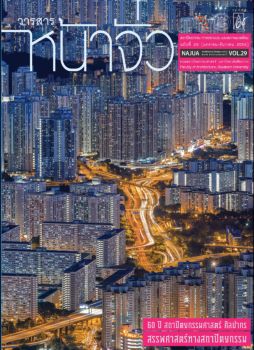แบบประเมินตนเองด้านคุณลักษณะสภาพแวดล้อม ภายนอกอาคารของสถานดูแลผู้สูงอายุสมองเสื่อม สำหรับประเทศไทย
Abstract
แบบประเมินตนเองด้านคุณลักษณะสภาพแวดล้อมภายนอกอาคารของสถานดูแลผูสู้งอายุ สมองเสื่อมได้ถูกออกแบบ และจัดทำมีวัตถุประสงค์เพื่อเป็นเครื่องมือสำหรับการประเมินความเหมาะสมทางกายภาพของพื้นที่ภายนอกอาคารในสถานดูแลซึ่งมีผู้สูงอายุสมองเสื่อมพักอาศัย โดยพัฒนา แบบประเมินจากเครื่องมือประเมินสวนสำหรับผู้ป่วยอัลไซเมอร์ (Alzheimer’s garden audit tool) ผนวกกับการศึกษาแนวทางการออกแบบและงานวิจัยด้านสภาพแวดล้อมภายนอกอาคารสำหรับผู้สูงอายุสมองเสื่อมทั้งในประเทศไทยและต่างประเทศจากเอกสารในช่วงระยะเวลา 10 ปีที่ผ่านมา แล้วนำมาทดสอบกับพื้นที่นำร่องเพื่อตรวจสอบคุณภาพของแบบประเมิน จากนั้นจึงจัดการประชุม เพื่อรับฟังความคิดเห็นจากผู้เชี่ยวชาญด้านต่างๆที่เกี่ยวข้องกับสภาพแวดล้อมสำหรับผู้สูงอายุสมอง เสื่อม เพื่อพัฒนาให้เหมาะกับการนำไปใช้ประเมินสภาพแวดล้อมภายนอกอาคารในสถานดูแลผู้สูง อายุสมองเสื่อมในประเทศไทย แบบประเมินฉบับสมบูรณ์ประกอบด้วยเกณฑ์พิจารณา 53 ข้อ แบ่ง ตามคุณลักษณะสำคัญทางกายภาพสำหรับผู้สูงอายุสมองเสื่อมออกเป็น 5 ประเด็นได้แก่ ด้านความ ปลอดภัย ด้านสนับสนุนการพึ่งตนเอง ด้านตอบสนองภาวะสมองเสื่อม ด้านรองรับการใช้งาน และ ด้านเอื้อต่อการดูแลรักษาระยะยาว แบบประเมินนี้จะเป็นประโยชน์ทั้งต่อเจ้าของสถานดูแล ผู้บริหาร รวมถึงผู้ออกแบบ ในการประเมินคุณลักษณะสภาพแวดล้อมภายนอกอาคารที่มีอยู่ได้ด้วยตนเองและ ยังเป็นข้อมูลอ้างอิงในการดำเนินการวางแผนงาน และการออกแบบปรับปรุงสภาพแวดล้อมภายนอก เพื่อเตรียมรับสังคมผู้สูงอายุในประเทศไทยที่กำลังจะมาถึง
Self-Assessment on Key Characteristics of Outdoor Environment for Long-term Caring of Dementia Aging in Thailand
Pavadee Ansusinha
Assistant Professor, Department of Landscape Architecture, Faculty of Architecture, Chulalongkorn University
The self-assessment of outdoor environment has been developed as a tool for evaluating outdoor environment of long-term caring for dementia aging in Thailand. The self-assessment tool developed from “Alzheimer’s garden audit tool”, reviewing both Thai and international design guidelines and researches about outdoor environment for dementia aging in the past 10 years. The pilot assessment tool was applied in an experimental area and evaluated by several experts who proficient in many aspects of outdoor environment for dementia patients to determine the quality of the tool and develop it to be a suitable assessment tool for long-term care of elderly with dementia in Thailand. The final assessment tool consisted of 53 criteria, divided in five key categories which are safety, self-reliance supporting, therapeutic functions, activities supporting and low maintenance. The self-assessment tool will be useful for both long-term care owners and designers to evaluate their own outdoor spaces and develop the outdoor environments which are more suitable for elderly with dementia to prepare for the upcoming an aging society.





